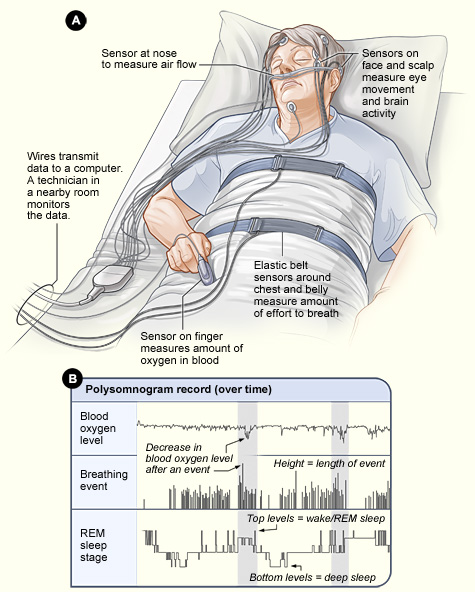- SleepStudy is one of the best ways to test out whether you suffer from Sleep Apnea.
- In addition, the Study will also allow the doctor to see what problems mayarise during your sleep.
This will enable the doctor to make recommendationswhich alleviates your problem. - SleepStudy is a multi-channel testing. The technician will attach a series ofsensors to the patient’s head, face, neck, chest, abdomen,
limbs and etc. Aftera night of recording, the data will be electronically transmitted via sophisticatedelectronic equipment and recorded.
The physiological activities will also benoted. Preliminary data recorded will be analyzed by a Specialist doctor and asummary report
will be written to determine whether you have Sleep Apnea. TheSleep Study instruments that our company use are wireless.
Patients can chooseto have the Study done at hospital or request a technician to your home fortesting.. - SleepStudy is conducted in two phases. The first phase is a multi-channel testingcalled Polysomnography, which includes EEG, EOG,
ECG and EMG. Here, themulti-channel testing refers to the various sensors reading a variety ofinformation through electrodes.
The information is then electronicallytransmitted and recorded on precise instruments for the sleep physician toanalyze.

Sleep Study –Polysomnography (1st phase)
- EEG — can show the sleeping stages of the patient
- ECG — can check the vascular condition during sleep
- EMG — can detect the muscular activity during sleep
- EOG — can determine whether the patient is in REM stage (Any dreams occur? Dreams often occur during deep sleep)
- Snoring — Airflow of mouth and nose – check the amount ofair the patient breathes
- Breast and abdomen contraction — shows thebreathing activity of breast and abdomen
- reast and abdomen contraction — shows thebreathing activity of breast and abdomen
- Leg movement — shows the leg movements duringsleep
- Sleeping position — shows the sleeping positionof the patient
- SPO2 saturation — shows the pulse oximetry
Sleep Study – CPAPsetting (2nd phase)
If you are diagnosed with sleep apnea after the Sleep Study (1stphase), your doctor will arrange an appointment with you to undergo a CPAP setting. Results from this setting will determine what pressure you should use.。
- On the day of taking the Study, continue yourdaily activity and avoid sleep at daytime.
- On the day of taking the Study, do not drinkcoffee, tea, alcohol or soft drinks.
- Inform the doctor if you are having any medicaltreatment
- Before having the Study, please bath and washyour hair. Avoid using body lotion and hair spray.
- Man: Please shave;
- Lady: Please avoid make-up
- Please wear pajamas with buttons in front. Thisfacilitates the Study.
- In order to get the best results, please admitto hospital or arrive home before 8:00pm and maintain a relax mood.
